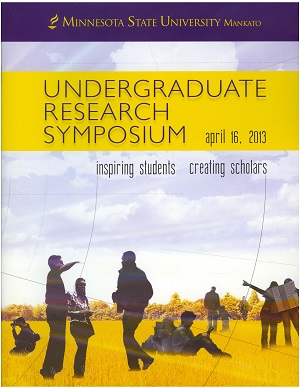Low-Cost Integration of Camera and Motion Capture for Use in Pediatric Neuromotor Therapy Options
Location
CSU 238
Start Date
16-4-2013 1:15 PM
End Date
16-4-2013 2:15 PM
Student's Major
Electrical and Computer Engineering and Technology
Student's College
Science, Engineering and Technology
Mentor's Name
Mohammad Habibi
Mentor's Department
Electrical and Computer Engineering and Technology
Mentor's College
Science, Engineering and Technology
Description
Obtaining quantifiable data on pediatric walking patterns has numerous applications in the biomedical field, including diagnosis, treatment planning, and developing physical therapy options. Motion capture (or mocap) and video capture are two commonly used tools for recording these data. The purpose of the proposed project was to develop a low-cost system to: I) synchronize video data from multiple perspectives; II) record mocap data without attaching markers to the child; and III) integrate EMG, mocap and video recording in one user interface. The intended use for this system is to assist in pediatric therapy options for children younger than 18 months with neuromuscular disorders. The project was divided into three phases. The requirement for Phase I was to record multiple videos from several perspectives. In fall 2012, we successfully implemented a solution via C# programming. Our solution is a program that allows the user to record videos from multiple webcams simultaneously and also analyze videos. To meet this end, we explored various aspects and options for Phase I via decision matrices. We also started to study the Phase II, which involves recording and analyzing the mocap data collected from multiple Microsoft Kinects. One future implication of this project is the availability of a low-cost, non- invasive biomechanics imaging system for physical therapists. Other applications include educational and automated diagnosis of gait disorders.
Low-Cost Integration of Camera and Motion Capture for Use in Pediatric Neuromotor Therapy Options
CSU 238
Obtaining quantifiable data on pediatric walking patterns has numerous applications in the biomedical field, including diagnosis, treatment planning, and developing physical therapy options. Motion capture (or mocap) and video capture are two commonly used tools for recording these data. The purpose of the proposed project was to develop a low-cost system to: I) synchronize video data from multiple perspectives; II) record mocap data without attaching markers to the child; and III) integrate EMG, mocap and video recording in one user interface. The intended use for this system is to assist in pediatric therapy options for children younger than 18 months with neuromuscular disorders. The project was divided into three phases. The requirement for Phase I was to record multiple videos from several perspectives. In fall 2012, we successfully implemented a solution via C# programming. Our solution is a program that allows the user to record videos from multiple webcams simultaneously and also analyze videos. To meet this end, we explored various aspects and options for Phase I via decision matrices. We also started to study the Phase II, which involves recording and analyzing the mocap data collected from multiple Microsoft Kinects. One future implication of this project is the availability of a low-cost, non- invasive biomechanics imaging system for physical therapists. Other applications include educational and automated diagnosis of gait disorders.
Recommended Citation
Taintor, Eric; Eric Diep; and Melissa Hoppe. "Low-Cost Integration of Camera and Motion Capture for Use in Pediatric Neuromotor Therapy Options." Undergraduate Research Symposium, Mankato, MN, April 16, 2013.
https://cornerstone.lib.mnsu.edu/urs/2013/oral-session-11/3




